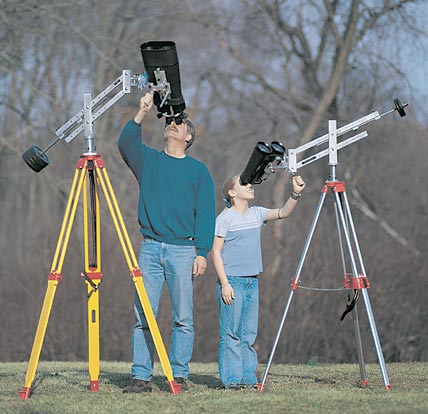So can I really use binoculars for astronomical observations?
The short answer is yes. Most people think that astronomy is only accessible by owning a telescope, but the truth is that binoculars are a great choice for stargazing at night. They have several advantages over telescopes and are definitely a good choice to consider. Still, telescopes remain the instrument of choice for astronomy for a number of reasons.
This guide weighs the pros and cons of using binoculars instead of a telescope. It will first list the advantages of using binoculars instead of a telescope, and then some of the disadvantages of binoculars compared to a good quality telescope!
The following guide is by no means an “everything” guide to choosing binoculars vs. a telescope, but it will give you the most important things to consider when shopping for astronomy equipment!
Binoculars are better than binoculars because…
There are 3 main reasons why binoculars have an advantage over telescopes.
Portability
Binoculars are more portable than telescopes, which is a huge advantage. Anyone who has ever used a telescope will tell you what a hassle it is to transport one. To get the best results in astronomy, you often need to move to a remote location with minimal distracting light from buildings, street lights, etc.
Most astronomers don’t stay in remote locations, so they have to be mobile and bring their telescopes. Shipping a 30 kg telescope is no fun, although it turns out to be worth it. Binoculars, on the other hand, weigh about 3 kg on average and are easy to transport! So if you find yourself on the road a lot during your astronomy nights, binoculars have an advantage due to their portability!
Cost
Compared to binoculars, binoculars are very cost effective. On average, decent astronomy binoculars cost $250. On the other hand, telescopes with comparable optical quality start at around $500. People on a budget often choose binoculars because of the lower entry price and because, psychologically, buying binoculars doesn’t seem as daunting as full-size binoculars.
Versatility
One of the great advantages of binoculars is that you can use them for purposes other than astronomy. They can be used for land observation and various other applications. Telescopes can be used for other forms of observing outside of astronomy, but because of the way they are made, the observing experience can be quite cumbersome.
Binoculars are not easy to maneuver, especially when looking at fast moving land objects such as ships or yachts at sea. Many users find the telescope too difficult to operate for anything other than astronomy, so this is where they usually use it.
On the other hand, binoculars can still be used for various applications. Binoculars are mostly built for terrestrial observations and astronomy binoculars are no different. These binoculars are great for long distance viewing and many users install them in their holiday home with a view of the sea, mountains or beach!
Binoculars are no better than a telescope because…
Now that we’ve highlighted some of the benefits of using astronomical binoculars, let’s look at the main reasons why telescopes remain the device of choice for many stargazers.
#Ability to collect light
To have a good astronomy experience, you need an instrument that captures as much light as possible. Astronomy is done under such harsh lighting conditions that you need the most powerful light-gathering equipment possible. To collect more light, you need larger lenses. This is often referred to as the diaphragm. A larger aperture means greater ability to see more of the night sky and observe deeper celestial objects.
Telescopes always have a greater ability to increase the aperture. Binoculars may be more portable, but they sacrifice aperture so you can’t see as much with them. On the other hand, telescopes can be as large as 300mm compared to binoculars which are around 100mm.
There is no doubt that you will see more of the night sky with binoculars than binoculars.
#Enlarge
Telescopes can magnify objects more than binoculars, improving the viewing experience of objects such as planets in the night sky. Astronomy binoculars usually have a fixed magnification of about 20x zoom. A lower zoom means they have a wider field of view and astronomy.
#Computer controlled telescope
One of the recent developments in the field of telescopes is the emergence of computer-controlled mountings. Computer-controlled montages use GPS technology to pinpoint the exact location of the telescope on Earth. From there, it can actually recommend views of the night sky to the user. Just press a button and the telescope will automatically move to view those objects!
These computerized montages have become very popular with novice and even experienced astronomers. To begin with, the ease of finding interesting things is very attractive. Similarly, computer-controlled features that allow telescopes to track the movement of objects in the night sky are highly attractive to experienced astronomers who prefer long-exposure astrophotography.
Computer-controlled mounts used to be the domain of high-end telescopes, but as technology has improved and production costs have come down, the price of computer-controlled telescopes has dropped every year. Manufacturers like Celestron, Mead and iOptron have a wide range of computer controlled telescopes for every budget!
So what should I choose?
In the end, the most important thing to consider is that there are pros and cons to choosing binoculars or a telescope. It all depends on what your main requirements are. What works for one may not work for another.
In general, it is highly recommended to use a telescope when getting into astronomy.
